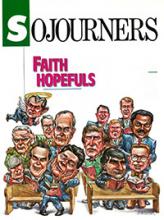MONDAY, December 7, 1987; 12 noon; Lafayette Park, across from the White House. Standing under a red umbrella torn to shreds, Phyllis Schlafly, president of the conservative, anti-feminist Eagle Forum, just finished explaining that the umbrella "demonstrates the nuclear umbrella that is not." She added, "The first job of government is to protect us from the international bad guys that might fire weapons at us."
On the 46th anniversary of the bombing of Pearl Harbor, and the eve of the signing of the INF (Intermediate Nuclear Forces) treaty by Soviet General Secretary Mikhail Gorbachev and U.S. President Ronald Reagan, Schlafly and a handful of supporters came to Washington to push for the development of the Strategic Defense Initiative (SDI), commonly called Star Wars. She said to the small crowd gathered, "Here we are, absolutely defenseless against a surprise attack ... We don't want a nuclear Pearl Harbor."
The chants of "Peace through strength" were beginning to wear out and the semi-melodious strains of "God Bless America" were just drifting off into the bitterly cold Washington air when an onlooker shouted, "We can blow up the world 30 times over with our nuclear weapons! You can only be dead once!" Betty Enfield from New York started telling everyone who would listen, "We can't have a strong nation when millions of people are hungry ... If Reagan really has a heart, he must look at his own country and see that it needs new priorities."
A woman with a sign saying "Peace in Jesus' Name" joined in on the side of anti-nuclear peace. Before a dozen words were out of her mouth, a cadre of shouting College Republicans was in her face, accusing her of not caring about children in Afghanistan, the most helpless victims of Soviet violence.
Read the Full Article

